On 25 March Greeks and Philhellenes all over the world celebrate Greek National Independence Day and the momentous events of 1821 which heralded the emergence of the modern Greek State after centuries of Ottoman subjugation. The armed struggle for the revival of Greece is legendary but it was also enabled by the resilience of the Greek Orthodox faith and, most importantly, the enduring spirit of the Greek language.
More than two centuries later there is a new ‘bilingual’ call to arms, so to speak, for the revitalization of the Greek language in Australia through the implementation of a Modern Greek Strategic revival strategy as explained by a leading linguistics expert, Professor Joseph Lo Bianco AM, in a recent presentation entitled Is There A Future For Modern Greek In Australia? which was held in Sydney under the auspices of the Greek Festival of Sydney.
Joseph Lo Bianco is Professor of Language and Literacy Education at the Melbourne Graduate School of Education, University of Melbourne, and the author of the National Policy on Languages (1987), as well as the seminal work “Pharos: The Vitality and Presence of Modern Greek in Contemporary Australia” (ACER Press, Melbourne 2021).
Indeed, in his opening remarks, the Greek Consul-General in Sydney, Yiannis Mallikourtis, who himself is passionate about the teaching of Modern Greek in the diaspora, stated that on taking up his diplomatic position he was advised by the noted Sydney University academic, Associate Professor Anthony Dracopoulos, to read Pharos to familiarise himself with the challenges of Modern Greek in contemporary Greek-Australian society. He was glad he did.
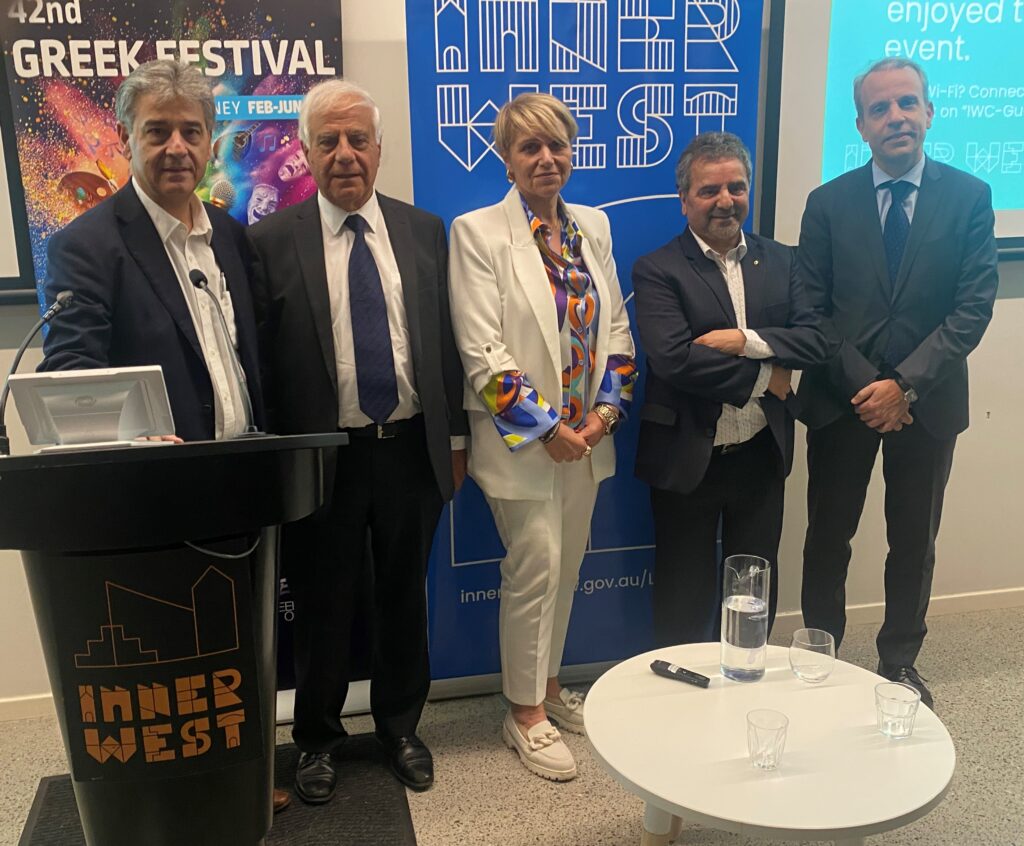
Professor Lo Bianco addressed the overarching problems that Modern Greek faces and lamented that Greek is an “endangered language” in urgent need of revitalization, not just through formal instruction or tuition at school and university but starting in the intimacy of the home with what he termed “family language planning”.
it is important to recognise that even homes where Greek is no longer claimed as a spoken language remain sites of identification with Greek and the language remains spoken in a wider family network.
And he stressed the core principles of C.O.D (or Capacity, Opportunity and Desire) to arrest the decline in domains where Greek is naturally spoken. In particular, the desire to learn Greek is crucial.
Professor Lo Bianco also spoke of the “ecology” of Greek in Australia which is marked by declining student enrolment and retention rates, teacher qualifications, available materials and resources, and the disadvantageous scaling of marks for Modern Greek and other languages at the NSW High School Certificate (HSC) and Victorian Certificate of Education (VCE) levels.
This is also particularly relevant given the threat to the study of Modern Greek at Macquarie University in Sydney through the proposed discontinuance of the Diplomas of Languages, including Modern Greek, offered by the Faculty of Arts.
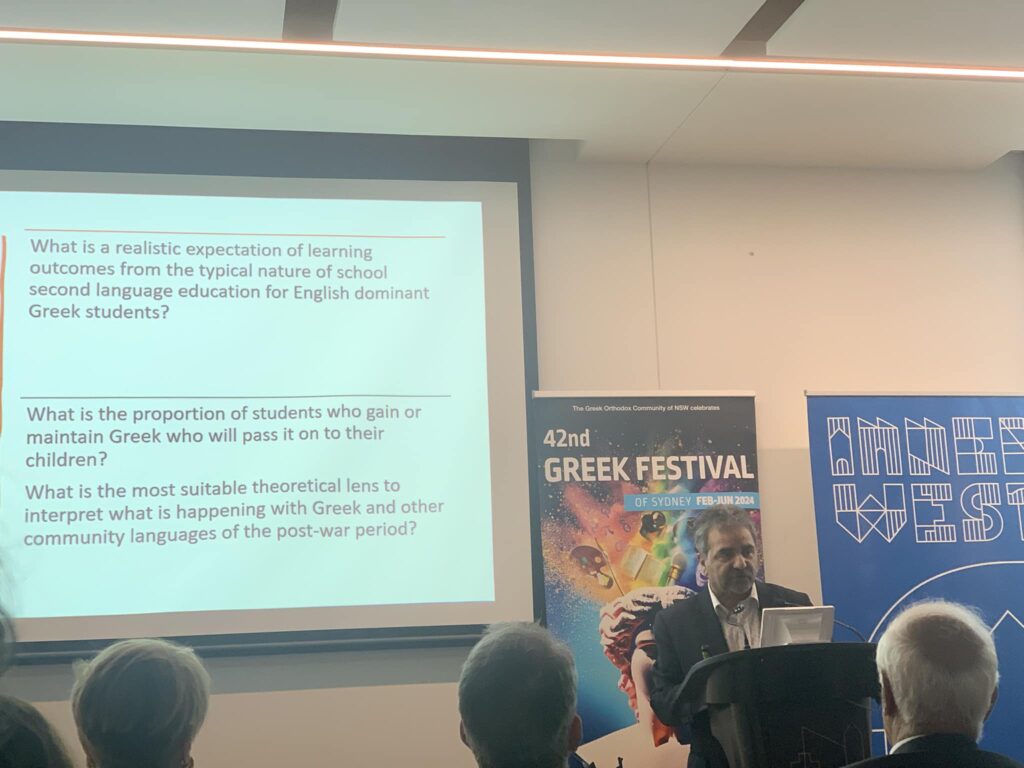
According to Lo Bianco, it is generally accepted that we identify with Greek in one or more of four ways.
As a language of ancestry, Modern Greek is present but as we saw above is three or more generations removed and is absent in the immediate familial domain (ie, parents to children). Students must learn ab initio (from the beginning).
As a language of heritage, modern Greek remains within the grandparents and extended family ranges as a spoken language but there is mostly a passive proficiency in the language amongst children in the immediate family. For those students, learning consists of residual or passive listening skills together with some active vocabulary knowledge.
Thirdly, as a language of community, modern Greek is present as an active “heard” language in exchanges between primary caregivers, mostly parents and grandparents, and their direct descendants, although bilingual dialogue is often present. Students’ learning includes acquisition of significant active vocabulary and expressive abilities.
Finally, Greek as a language of professional life is prevalent amongst new Australian Greek arrivals, Greek-Australians who actively using modern Greek at home, regular travellers to Greece who use modern Greek and professionals who use modern Greek actively.
In all four cases, language is accompanied by the acquisition of a greater cultural awareness and insights.
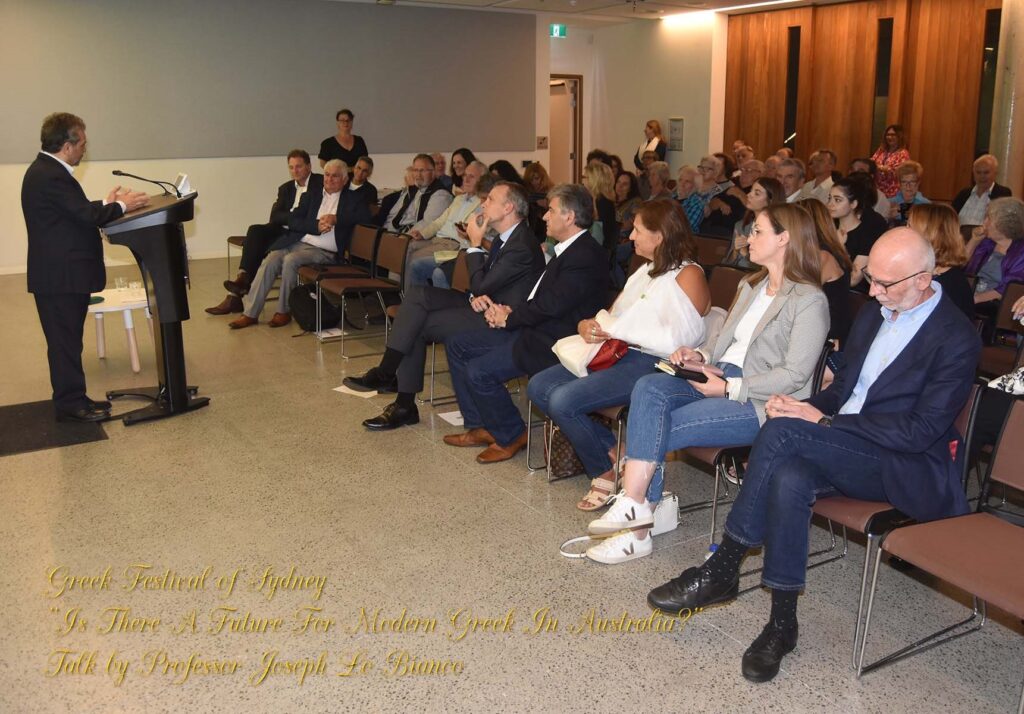
In order to succeed, Greek teachers, Greek teacher associations and the wider community must build language capacity in language learners; create and reward opportunities to use the language, and foster a positive desire to identify with, use and want to improve in the language.
According to Lo Bianco, whilst the formal teaching and learning of the language is crucial, it is not enough. Because language decline is inevitable, usage is as important as study. And it is in the home where families can help to encourage an intimacy in language so that, in step with community language classes, children can be raised bilingually.
In a 2009 publication “Second Languages and Australian Schooling” published by the Australian Council for Educational Research (ACER), Professor Lo Bianco wrote of the cultural and intellectual benefits of bilingualism:
“Becoming literate involves a growing understanding that language is a system, governed by rules and patterns. Learning a second language leads to a similar, perhaps more intense, appreciation of this systematic character of language. This insight is called ‘meta-linguistic awareness’ and has been shown to have considerable academic benefit for children who are able to reflect on language in more careful ways, if they become aware that any one language is an arbitrary and not a natural system. Children who are exposed to two languages at home can show enhanced cognitive flexibility and greater meta-linguistic awareness.”
Bilingualism of course presents its own challenges, such as overcoming what the learned presenter described as the incidence of “refuseniks”, or young children of Greek-Australian background who rebel when they get to mainstream English language-dominant school and are reluctant to speak Greek amongst their peers.
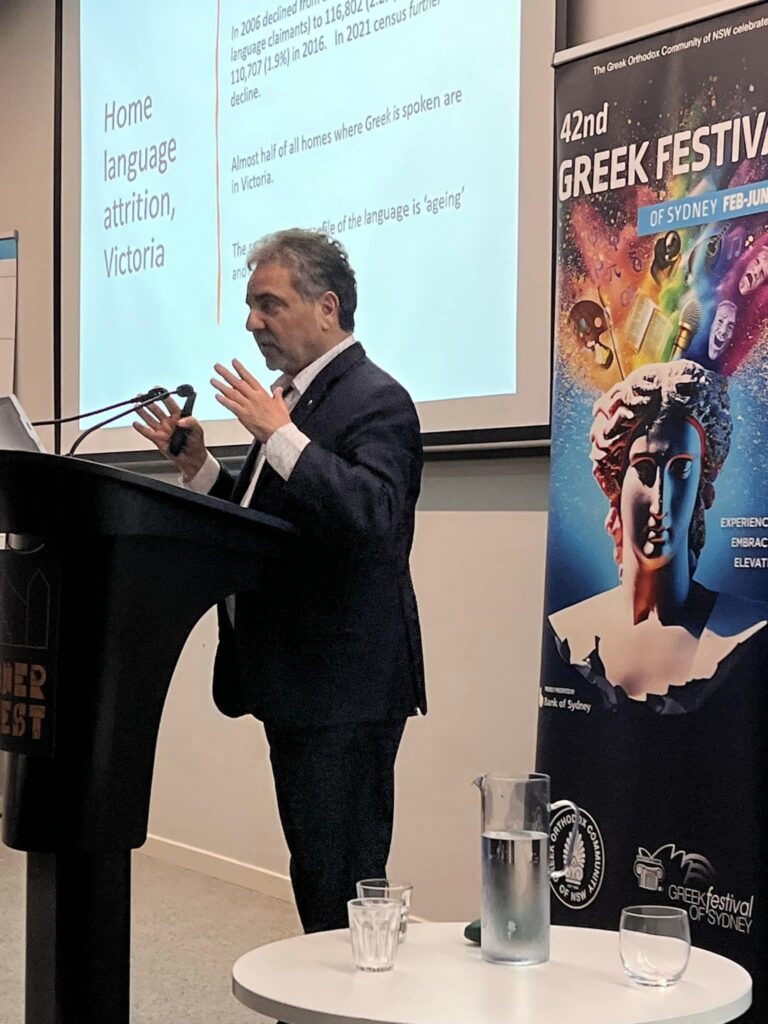
Professor Lo Bianco suggests that families discuss with their children a plan for the children to become champions for Greek. Examples include writing an early language plan, establishing a “Greek room” in the house and allocating time and space for Greek language immersion.
Most Greek Australian children, because of their English dominant cohort, think primarily in English and their lexical range is narrowing. Children must be encouraged to think independently in Greek and be able to think Greek concepts and words.
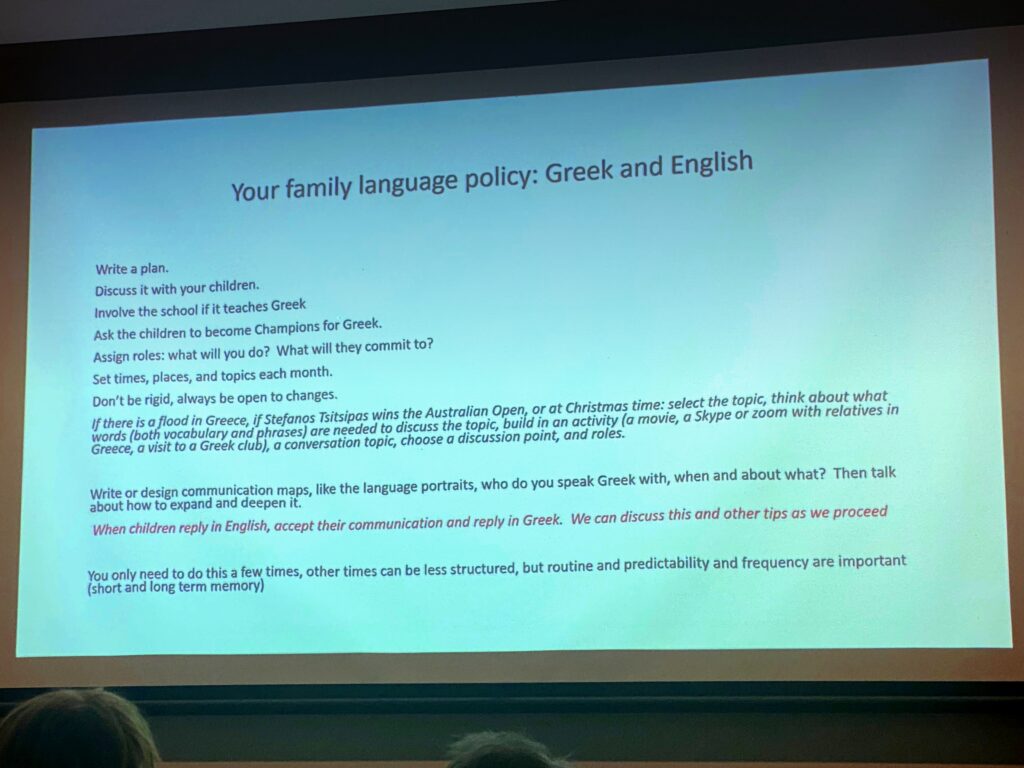
After all, Greek may have become one of the languages of older people but young people will keep the language alive.
In this writer’s case, I will attempt to engage my oldest grandchild, now aged 6, in Greek on such topics as my favourite ποδοσφαιρική ομάδα AEK Athens inevitably winning the Eλληνικό πρωτάθλημα (Greek Super League), the history and natural wonders of my beloved Greek isle, τα Κύθηρα, το νησί της Αφροδίτης, and of course my quest for the return of the Γλυπτά του Παρθενώνα (also known as τα Ελγίνεια). Alas, in this last example, there is no direct Greek translation for the observation that I have lost my marbles.
On a more serious note, the maintenance of the Greek language should also be strongly supported in clubs and community associations. The Kytherian World Heritage Fund is one such organisation that seeks to promote literacy and awareness of Greek culture, history and literature and sees distinct benefits in this approach.
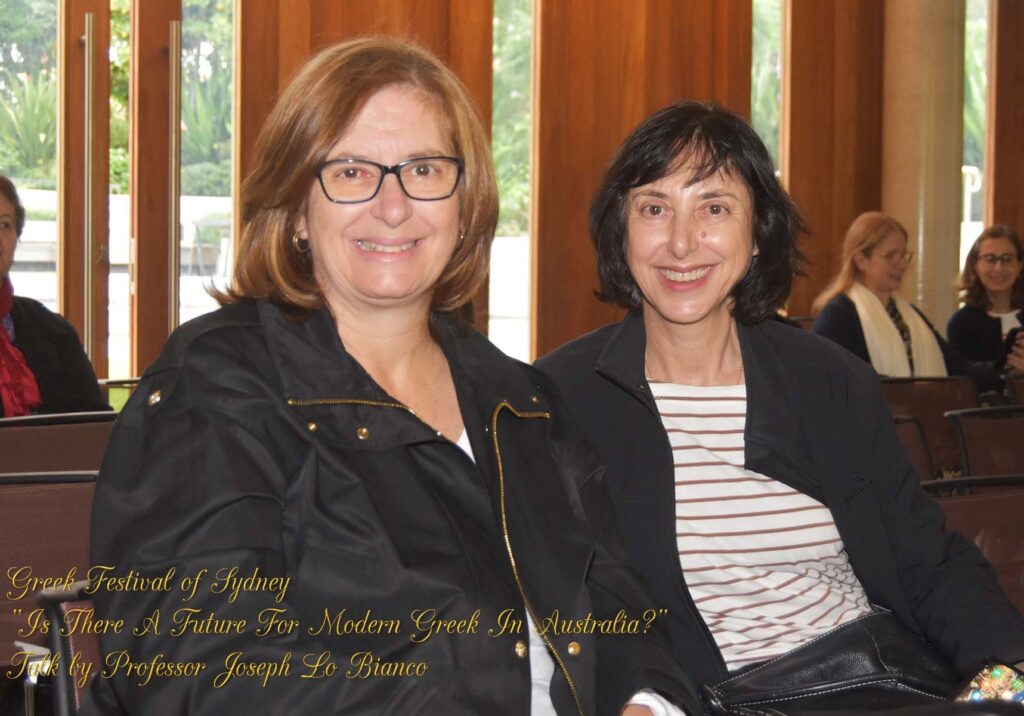
Professor Lo Bianco has in recent years worked closely with the Modern Greek Teachers’ Association of Victoria (MGTAV) in helping to compile a National Modern Greek Strategic Plan with the aim of achieving a common understanding of the state of the language; creating a set of national principles focused on strengthening the use of Modern Greek in Australia, and determining a statement of excellence to guide all providers of Modern Greek.
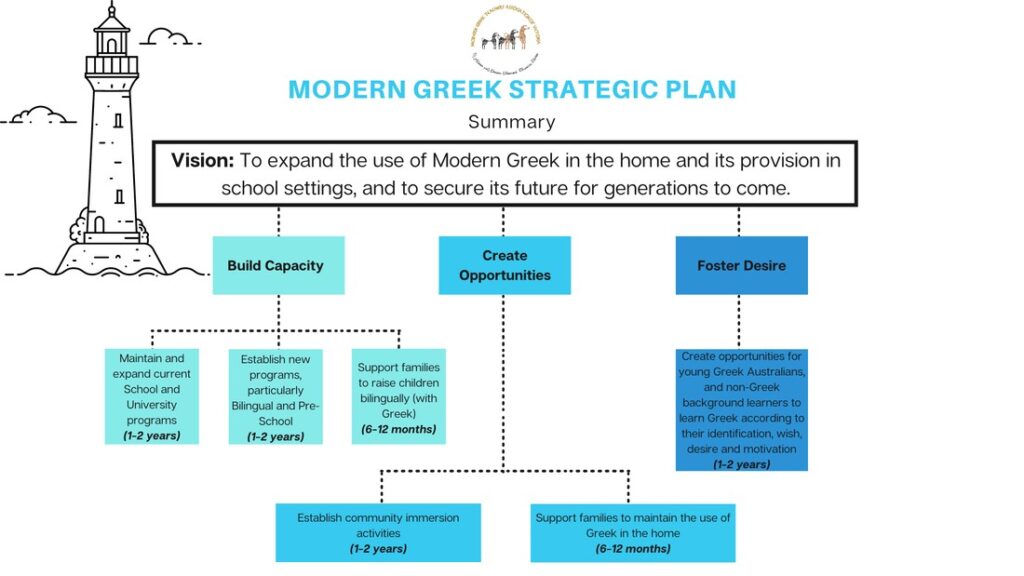
Such a national Modern Greek strategic plan would include:
- A shared understanding of the challenges facing Greek teaching and maintenance
- The creation of a set of national principles of collaboration to strengthen use of Greek in Australia
- The production of a statement of excellence to guide all providers of modern Greek education
- Lobbying governments at all levels to increase funding and facilities for language teaching
Those who attended the presentation at the Inner West Library would have been impressed by the advocacy and steely determination of Professor Joseph Lo Bianco in striving for a coherent and coordinated national vision for language education and learning that aims to ensure that Modern Greek survives for the benefit of future generations in Australia.
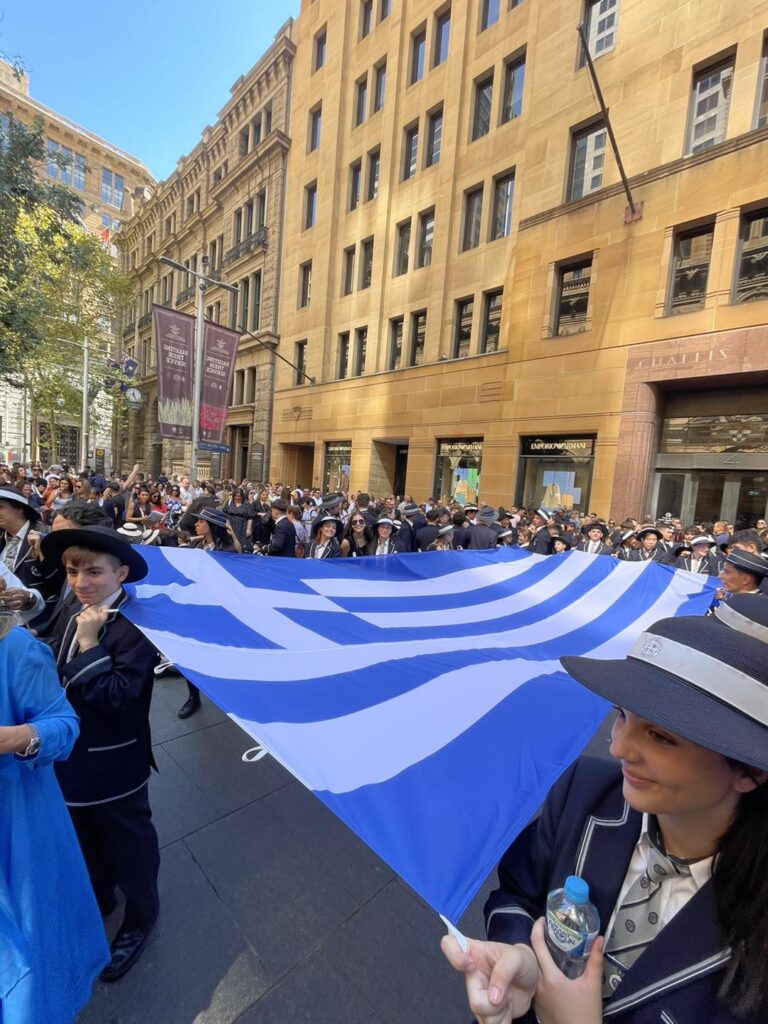
And so, for the young Greek students who marched proudly with the Greek Flag in Sydney to celebrate Greek National Independence Day, and for their families and the wider community, keeping the Greek language is also a cultural and historic imperative.
To adapt the oft-quoted statement by the Romantic poet, Percy Bysshe Shelley, we are all Greeks in every sense.
George Vardas is the Arts and Culture Editor. He is also a member of the Multicultural NSW Advisory Board and serves on the Kytherian World Heritage Fund.


